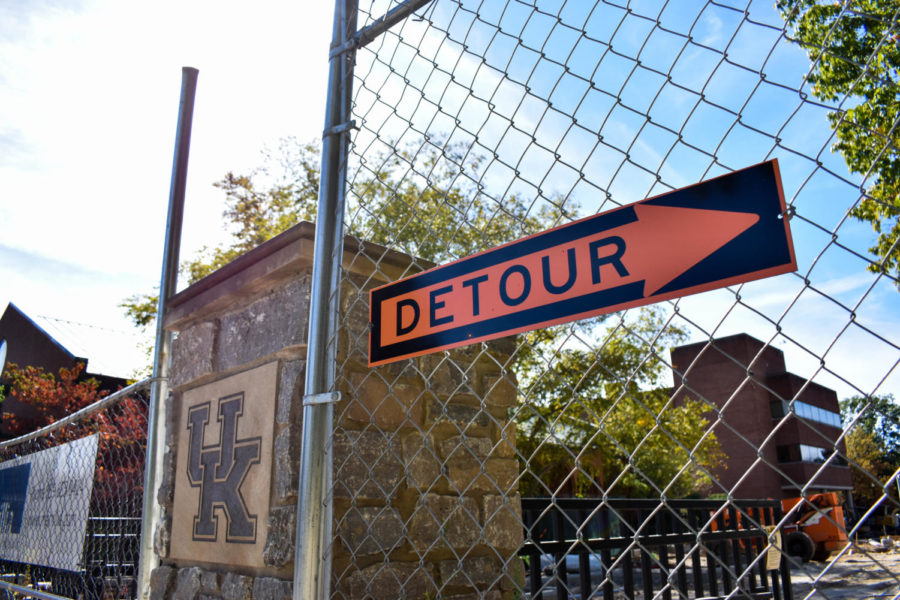Editorial: UK needs more acceptability and accessibility on campus
Cones and fences prevent traffic on Rose Street on Tuesday, Oct. 11, 2022, in Lexington, Kentucky. Photo by Abbey Cutrer | Kentucky Kernel
October 13, 2022
On campus tours, many future Wildcats can admire the beauty of campus and the new buildings, but what they may not see are the parts that are not quite as nice and accessible.
Between elevators that are too tight to fit a wheelchair, full handicap parking and endless construction that makes campus difficult to navigate, UK can be less than enjoyable for students with disabilities.
The Disabled and Ill Student Coalition Instagram account is petitioning for more accessible infrastructure because of these issues that still exist on campus.
According to a Coalition post, it has had difficulties talking to UK president Eli Capilouto and administration about its concerns with the accessibility of the campus.
Buildings like Blazer Dining Hall and Pence Hall have elevators that are compact, which can be difficult for students using wheelchairs.
These students are limited in their ability to get places in these facilities because their only way to travel to different floors is often by the elevators.
Ramps can be used as an alternative to stairs, but in some places on campus, these ramps are steep and difficult to use.
The incline beside Patterson Office Tower is one example of this. For those who use wheelchairs, this ramp can be difficult to travel.
Additionally, according to UK, handicap parking passes cost $42 a month for the 2022-2023 academic year. In contrast, student periphery parking cost $34 a month.
Despite the higher cost of parking, the handicap spots that are available on campus are frequently full, leaving some students without a place to park that is close to their desired locations.
These spots are also available for students with temporary disabilities if they apply and are accepted for a campus handicap pass.
Though more students may have passes for these spots, the number of spots have not increased.
This lack of parking can be frustrating for students who need it, and they often must travel further distances to their destinations even though they might not be in the adequate physical shape to do so.
Not only does the lack of parking affect people with disabilities’ accessibility to campus, but the continual construction through main parts of campus make it difficult for them to take the most direct route to where they need to go.
Projects like the construction on Rose Street make it difficult to travel from one side of campus to another. The construction forces students to find detours, which often take longer to travel.
The construction can both prohibit travel on certain routes and cause the pavement around the area to be rough. This may be difficult for people who use a wheelchair or crutches to travel safely.
Though these issues are serious and affect the experience of those with disabilities on campus, there are practical steps the university can take to improve these conditions.
Implementing meaningful changes in and around construction projects can be crucial to making the campus more accessible.
For example, keeping the sidewalks smooth and easy for those with disabilities to use, limiting the amount of construction happening at one time and undertaking projects that help those with disabilities are changes that will directly address the campus accessibility issues.
Infrastructure projects that make bigger elevators, less steep ramps, wider walkways, more direct access to campus and more handicap parking are helpful and meaningful.
We can, we must do better to ensure the experience at UK is wonderful for all.


































































































































































Shelbie • Oct 17, 2022 at 9:16 pm
As someone who has struggled to get around campus I feel this in my soul. After my cancer surgery last year I was belittled by the parking authority and shamed for needing to park closer to my classes.
Ty Borders • Oct 17, 2022 at 10:21 am
The College of Public Health building is 2 stories and doesn’t have an elevator!